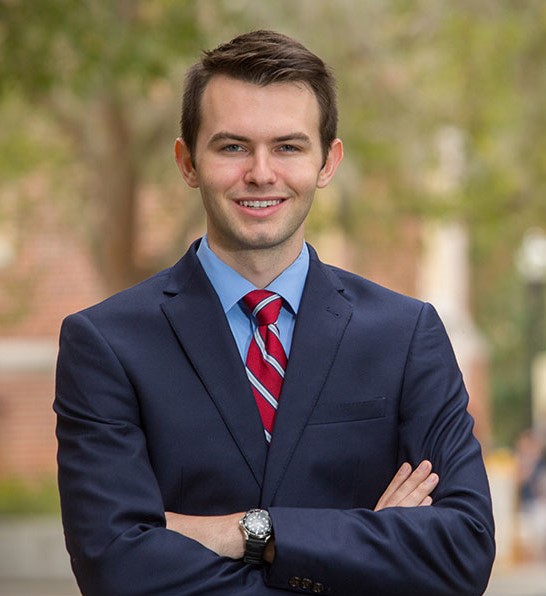FSU’s Gil Damon charts unconventional course to Rhodes Scholar finalist

Florida State University senior Gil Damon called it an honor to participate today as a finalist in an interview for a prestigious Rhodes Scholarship to the University of Oxford in England.
Damon, 21, prepared for this moment for months and while his name was not listed in the final group of 32 U.S. scholarship recipients, Damon had no regrets over his effort.
“It’s a little surreal to get this far, just to be considered,” Damon said. “I don’t know if I really have a sense of it yet. All of the candidates are extraordinary people.”
Damon, a double major in political science and psychology, charted an unconventional path on his journey to becoming Florida State’s seventh finalist for a Rhodes Scholarship in the past 11 years.
He studied one year at Tallahassee Community College before transferring to FSU where he has earned a perfect 4.0 GPA. He has interned at NASA, the Florida Capitol, United States Senate and the White House. He spent a summer piloting a 40-passenger tour boat down the Wakulla River through alligator-infested waters, while simultaneously explaining the finer points of “snakebirds” and Suwannee cooter turtles.
Damon grew up along the Gulf Coast in Wakulla County. He saw firsthand the devastation of Hurricane Dennis in 2005 and the serious environmental and economic damage caused by the BP oil spill in 2010. Those lessons, and his own intellectual curiosity, led him to focus his studies on the way science and public policy interact.
The experiences taught Damon lasting lessons that influenced his thinking about the convergence of science, government and politics during emergencies, and he watched how those institutions collaborated, or sometimes clashed, when needed most.
“Wakulla County is a rural area that’s seen a lot of crises that relate to the environment and relate to science,” Damon said. “I’ve really developed a passion for how science and policy interact. What I’d like to do is focus my life in a way where science and politics can understand each other better, work better together and produce better outcomes.”
Damon’s efforts outside the classroom have been just as constructive.
He joined the Student Leadership Council in the College of Social Sciences and Public Policy, where he helped form the Nonpartisan Exchange Team. The group brings together students with polar opposite political views and encourages them to talk about how they form their political perspectives.
Damon said it’s not about who’s right or who’s wrong. It’s not a debate — it’s a chance to have a conversation and, hopefully, promote understanding.
“We found if you put people together who are willing to talk, generally they end up as friends,” Damon said. “We saw friendships form, and that’s really powerful. If we can actually create more situations where a Democrat and a Republican — or folks from any place in the political spectrum — can talk to each other, then we can strengthen our society.”
Damon’s commitment to excellence has earned the admiration of his professors.
“Gil is an exceptional young man,” said Carol Weissert, FSU’s LeRoy Collins Eminent Scholar and professor of political science. “He is smart, engaged, ambitious and well-rounded. He is a great representative for FSU.”
Professor Ashby Plant, director of Florida State’s Social Psychology Area, called Damon a dedicated scholar.
“Gil takes full advantage of his education and is tireless in applying what he learns in the classroom to real-world problems and issues,” Plant said. “In all of my experiences with him, he has demonstrated an eagerness to engage in every possible intellectual opportunity.”
Ten years ago, Florida State Assistant Provost Joe O’Shea — an FSU senior in 2007-2008 — became the university’s fourth Rhodes Scholar.
O’Shea vividly recalls the emotions he experienced before the interview, and he gave Damon insights on how to handle that part of the process.
“I told Gil it was possible he would be the only person from a public university at the interviews for finalists,” O’Shea said. “Don’t let that intimidate you: FSU provides a world-class education that has prepared you well for this moment. You have a compelling narrative and a commitment to the public good that is both genuine and powerful.”
Craig Filar, associate dean of Undergraduate Studies and director of the Office of National Fellowships, hopes Damon’s success will encourage other students to capitalize on the many opportunities at Florida State.
“It has been a wonderful experience to see Gil grow throughout his time at FSU and through his pursuit of the Rhodes Scholarship,” Filar said. “I hope his journey inspires more students to challenge themselves to find creative, innovative ways to grow beyond their current goals and discover all they can accomplish as a student at FSU.”
Florida State’s Rhodes Scholars are Frederick William Buchholtz, 1905; Caroline Alexander, 1976; Garrett Johnson, 2006; O’Shea, 2008; and Myron Rolle, 2009. In addition, FSU had Rhodes Scholar finalists in 2009, 2011 and 2012.
Rhodes Scholarships, created in 1902, are the oldest and among the most distinguished international fellowship awards in the world. Scholars are selected based on academic achievements, character, leadership qualities and commitment to others.

